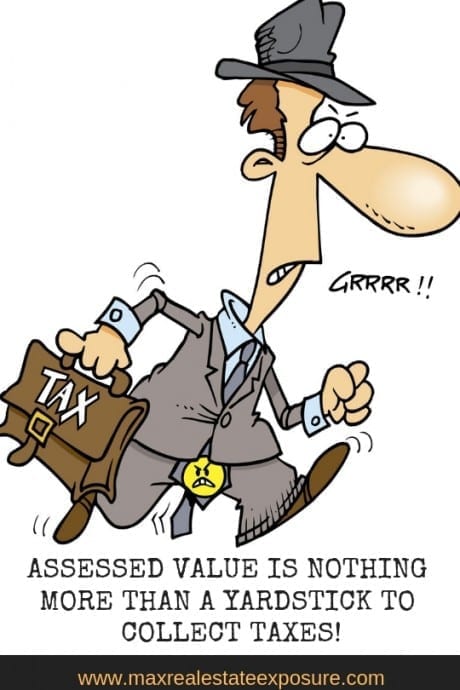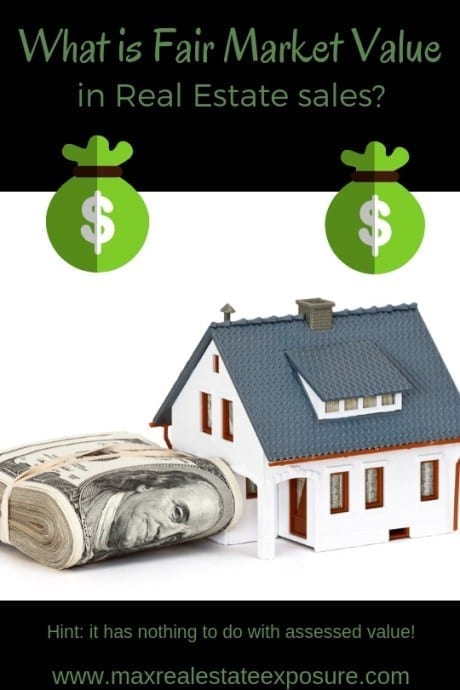Do you know the definition of assessed value and how it relates to your property taxes?

How about the difference between assessed value vs. market value?
We will examine the differences and how they will impact your property tax.
If you think assessed value and market value have any correlation with one another, then you are wrong!
As you read further, you will discover the difference between assessed and fair market real estate values.
Over the last thirty-seven years, while working as a Massachusetts Realtor, one of the misconceptions that I routinely come across is people who like to draw a definitive correlation between a home’s assessed value and its market value.
Let’s set the record straight – there is very little correlation between the two figures in most circumstances.
Some of the biggest perpetrators who misuse this information are Realtors themselves!
Of course, a Realtor who will discuss a home’s market value to its assessed value will only do so if it sheds a positive light on the property they are marketing.
Unfortunately, the myth of assessed Real Estate values having a strong correlation to their present market value persists.
The general public often gets confused because some Realtors fail to educate their clients about the big difference between assessed and market values.
Looking at assessed values is as good as using Zillow.com to determine what a home is worth! If you have researched Zillow, you know how inaccurate home values on Zillow can be.
Real Estate Agents Are Often To Blame for Assessed Value vs. Market Value Misconceptions
When the tax value the town places on a home is higher than what a property is on the market for, you will often see a Realtor’s advertisements that say something like this: “Come to see this bargain home that is priced at $100,000 less than the assessed value”.
This immediately tells me that the Realtor either is not educated on property valuation or believes there will be someone ignorant enough to think the house is the bargain of the century. Someone who knows better will realize the property has been over-assessed by the town, and the seller has been paying too much in taxes!
The opposite of this scenario is homebuyers who see a property listed higher than the assessment. If their buyer’s agent has not appropriately informed them, they will use this data point in their negotiations when submitting an offer.
A buyer argues their offer is a particular amount because of the tax value.
If more Realtors did a better job of teaching the public about the difference between fair market value and assessed value, there would be far less confusion. Potential buyers would never try to correlate property assessments.
In most cases, assessed values are worthless data when figuring Real Estate values.
What is Assessed Value?
What does assessed value mean? Great question, right? Many people will ask a real estate agent the assessed value definition.
Most people realize Real Estate can go up or down depending on the market. As values rise or fall, some folks think their taxes will increase. People generally arrive at this conclusion when they misconstrue that tax assessments and market values are the same.
In theory, this should be the case. However, assessed values are only a yardstick for a municipality to collect appropriate property taxes to sufficiently cover the state and local appropriations chargeable to the city or town.
 The town must get a specific amount of revenue yearly to run the municipality. These figures will determine the inc0me needed.
The town must get a specific amount of revenue yearly to run the municipality. These figures will determine the inc0me needed.
If market valuations of homes are dropping, assessments will eventually catch up to them, but in the meantime, towns will increase the tax rate as necessary to ensure they still get the funds required to cover their budget.
Local government will use the property tax rate or mill rate by which assessed values are multiplied to determine your property tax bill.
It can also be called the assessment rate. So, the assessment of your property is used for nothing more than tax purposes.
Simply, it is how they calculate property taxes.
How Does an Assessor Figure Out Assessed Values
You’re probably wondering how the government assessor comes up with the tax-assessed value.
There are several things an assessor will do to arrive at assessed property values, including:
- Comparable home sales – assessors will use recent sales in the area with similar characteristics to arrive at an appropriate number. These are known as comps.
- Improvements are taken into consideration. One of the reasons tax assessors ask to visit properties is so they can verify what improvements are made. These home inspections are often triggered when a homeowner pulls a building permit. For example, a significant addition or kitchen remodel could influence their valuation.
- Rebuilding costs and land values will be taken into consideration. Lot size can be a significant variable with assessment value.
A property tax assessment is conducted using mass appraisal techniques with the help of automated computer programs. This is because assessors often have many properties to consider.
The assessor may use the computerized assessment as a starting point but may adjust the determined valuation based on the specifics of the house in question.
An assessor determining the assessment of a single-family home with four bedrooms and 2.5 baths would compare it to other homes with similar characteristics. However, if the homeowner made substantial modifications with high-end upgrades, it could impact the assessor’s opinion.
The location, square footage, number of bedrooms and baths, and lot size are all significant factors in taxation.
Property Assessed Value Lags Behind Market Value
Remember that the property tax valuation of a home often lags behind the market because the valuations are not re-calculated until the beginning of the following calendar year.
So, if the market value of local properties is declining, it is not unusual to see the assessment being higher. Likewise, if values are heading up, it could be the opposite.
Property’s assessed value rarely, if ever, is the same as market value.
While practicing Real Estate, I have seen some of the strangest things regarding assessed home values. Believe it or not, I have seen some homes as much as a couple hundred thousand over or under-assessed compared to their market price.
I have seen two new construction properties built by the same builder side by side where house “A” had more square footage and had a more considerable lot than home “B,” yet house “B” was charged more in taxes due to a higher tax value. This should never happen, but it does!
Assessed Property Value is More Accurate When It’s Recent
Properties re-sold more recently will usually have a more accurate correlation of their market value vs. assessed value than a house that has not sold in a long time.
For example, a house sold a couple of years ago will usually have a stronger correlation than a house sold fifteen years ago. Cities and towns see the market adjustments more clearly and move the tax value appropriately.
However, it is essential to note that some cities and towns update their property assessments at various times. Some states may update them yearly, while others may update them every five years or something in between.
Property taxes are typically more just when a reassessment is done frequently. As a consumer, you can expect the assessment ratio to be more accurate with fresher information. When you make a home purchase, it is essential to remember this.
Market conditions, on the other hand, are constantly in flux. Another good reason is that there is little correlation between these valuations. There is no uniform percentage for the calculation of the differences.
Challenging Assessed Value of Property
The town over-assesses a homeowner who feels over-assessed, files a challenge, and wins an abatement. This is another example of how assessments can become slightly skewed. Their assessment has now changed to a lower amount.
Lowering your real estate tax bill is possible when you challenge and win a high property tax assessment.
Does every other homeowner with a similar property get a notice in the mail saying their property’s assessed value will also come down courtesy of the research done by Mr. Smith, who lives down the street?
If life were only that grand! This is the perfect example of the squeaky wheel getting the grease.
What is Fair Market Real Estate Value?
 So, how do assessed values and market values differ?
So, how do assessed values and market values differ?
The fair market valuation of real estate is what a buyer would be willing to pay for a property on the open market with no undue influence.
People in the real estate industry often mention the term “arms-length transaction.” An example of a non-arms length transaction occurs when a family member purchases a property at a discounted price compared to its market value.
Often, in real estate, if one family member buys from another, they don’t always purchase at the total value of the property. Under these circumstances, you could not conclude that the property is worth the reduced sales price.
If the seller puts the property on the market and offers all real estate buyers an equal opportunity to purchase the home, we would conclude that the fair market value is whatever the sale price ends up being.
Some additional examples in real estate exist where extenuating circumstances cause properties to be sold for less than the fair market value.
A few of these circumstances include selling a home in a divorce or when an owner gets transferred to another part of the country.
Sometimes, time constraints limit selling options, and an owner may discount the sale price to sell the home quickly.
The town hall should make all the necessary information regarding the application process and the filing deadlines available to you.
Distressed Properties Often Sell Under Market Value
A distressed property will usually not sell for total fair market value either. A distressed property could mean many things – some examples include an unusual amount of foreclosures close to the home, a toxic waste dump nearby, the property being in a flood zone, or other similar issues that could cause buyers to look elsewhere for homes.
As a homeowner, you determine real estate fair market value by looking at what other similar properties have sold in your area.
To consider a sale as a comparative sale, it must have occurred in the last six months. Anything longer than six months lenders and appraisers will not look at. The homes should be of similar size, style, and characteristics.
Either a competent Realtor or an appraiser can determine your home’s real estate value. Keep in mind the word competent. Like anything else, evaluating the fair market value of real estate is a skill.
Real Estate agents will perform a comparative market analysis or broker price opinion, and an appraiser will complete an appraisal.
Appraised Value vs. Assessed Value
The appraised value of a home is not the same as the assessed value, much like the market value. Appraised values and market values should have much more in common with one another.
A professional certified appraiser conducts a home appraisal. This is done in a real estate transaction where the buyer gets a mortgage. Mortgage lenders want to ensure they lend money on a property equal to or higher than the purchase price.
When homeowners are looking to refinance into a new mortgage, they will also ask an appraiser to provide property market values. Theoretically, the fair market value and appraised value should be relatively similar.
When appraisers and real estate agents determine a fair price, they use comparable sales data to arrive at a definitive property value.
In essence, these two figures are nothing more than opinions of value. They should, however, be based on previous sales data that a reasonable person would conclude is substantially similar.
So, just like market value, the property appraisal is rarely similar to a county’s tax calculations. The value calculated is often significantly different.
How to Find Property-Assessed Value
There are a few ways to find the assessment of a property. You can visit the town hall and the tax assessor’s office. They will have the assessed property value of every home in the community. Ask the clerk for the specific property address, and they can provide the information.
If you speak to a local real estate agent, they can also give you the valuation of a home you’re curious about. Real Estate agents have access to the Multiple Listing Service, which provides assessment data for every home.
Of course, an owner’s property tax bill will also show the assessment.
How to Challenge An Assessed Home Value
 Sometimes, a homeowner will purchase a property for X number of dollars. Later, after getting their tax bill, they feel the county’s estimation is way out of line vs. the market value. No surprise there, as it happens all the time!
Sometimes, a homeowner will purchase a property for X number of dollars. Later, after getting their tax bill, they feel the county’s estimation is way out of line vs. the market value. No surprise there, as it happens all the time!
So, what should you do if your assessed value is out of line with other similar homes in your neighborhood or town?
You could head to your local assessor’s office and file for a tax abatement! The town hall should make all the necessary information regarding the application process and the deadlines for filing available to you.
Applications for tax abatements are due on or before the due date for payment of the first actual bill. The town’s assessor has up to three months in Massachusetts to approve an abatement request.
If you are denied your abatement request and do not feel that the assessor made the proper ruling, you can appeal to the State Appellate Tax Board.
The assessment appeals board will either rule in favor or against your request. It is usually helpful to get legal advice from a real estate attorney.
Conclusions on Market Value vs. Assessed Value
In summary, a public tax assessor evaluates a property for taxation purposes.
Market value, conversely, is the agreed-upon price between a willing and informed buyer and seller under usual and ordinary circumstances.
It is the highest price the property will bring when exposed for sale on the open market to a buyer who is purchasing with full knowledge of the property’s highest and best use.
Hopefully, after reading this, you have learned that assessments have nothing to do with a property’s market value.
About the Author: The above Real Estate information on what assessed value is was provided by Bill Gassett, a Nationally recognized leader in his field. Bill has expertise in mortgages, financing, moving, home improvement, and general real estate.
Learn more about Bill Gassett and the publications he has been featured in. Bill can be reached via email at billgassett@remaxexec.com or by phone at 508-625-0191. Bill has helped people move in and out of Metrowest towns for the last 37+ years.
Are you thinking of selling your home? I am passionate about real estate and love sharing my marketing expertise!
I service Real Estate Sales in the following Metrowest MA towns: Ashland, Bellingham, Douglas, Framingham, Franklin, Grafton, Holliston, Hopkinton, Hopedale, Medway, Mendon, Milford, Millbury, Millville, Natick, Northborough, Northbridge, Shrewsbury, Southborough, Sutton, Wayland, Westborough, Whitinsville, Worcester, Upton, and Uxbridge MA.

